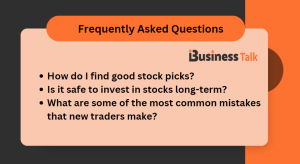
How to Make Money With Stocks? – The Ultimate Beginner’s Guide
If you’re considering investing in stocks and shares, this blog is for you! Here, you’ll learn everything you need to know about stocks and shares – from what they are to how to choose the best ones. You’ll also be able to understand the tax implications of stock investment and how to make money with stocks safely and profitably. So take a read and learn all there is to know about investing in stocks and shares!
What are stocks?

Stocks are a type of investment that gives you a share in the company that holds them. When you buy stock, you’re buying a piece of the company as well as its future earnings (assuming it survives!). The more stock someone has, the greater their voice and voting power within the company – so be sure to think carefully before investing!
How to choose stocks?

The first step when choosing stocks is to understand the different types of stock. There are three main types of stock: common, preferred, and hybrid.
The common stock holds a majority of the voting rights in a company, meaning that it can easily be bought and sold on the market – making it risky for investors.
Preferred stock has certain benefits (such as higher dividend payouts) over common stock but still carries some risk with it, as its value can be affected by market conditions.
Hybrid securities combine elements of both preferred and common stocks – this makes them more advantageous for investors, as they can gain the benefits of both types while mitigating some of the risks.
Once you’ve decided on your stock type, it’s important to decide upon a company and its sector. For example, technology stocks are likely to be more volatile than those in the healthcare or automotive sectors – so ensure that your investment is appropriate for the market conditions of the individual company you’re considering investing in!
Finally, it’s worth being aware of stock price fluctuations – which can happen at any time and without warning. Ensure you have a plan for dealing with stock market volatility and understand your individual investor’s risk tolerance before investing.
How to Make Money With Stocks?
Making money with stocks can be a lot of fun but can also be daunting. That’s where a reliable stock quote service comes in handy. Once you have the quotes, it’s time to decide which stocks to buy. To make the process easier, start by studying the company and its history. Be sure to avoid penny stocks and invest in quality companies that will offer long-term returns. With a little bit of effort and research, making money with stocks is definitely within reach!
1. Decide How much you Are going to Invest
Before investing in stocks, it is important to clearly understand what you are willing to risk. Stock market indices can be helpful in making this decision. Once you know the kind of stock you want to buy, it is time to trade and decide how much you will invest and how to profit from it.
2. Choose the Right Stocks to Invest In

It is important to do your homework before investing in stocks. You need to consider many factors, such as the company’s financial condition, industry trends, and stock price fluctuations.
Be sure to pick quality companies with good fundamentals that will offer long-term returns. Do not invest in penny stocks! Penny stocks can be risky and unreliable, so avoid them if possible.
Generally speaking, buying stocks when undervalued and selling them when they are overvalued is a good idea. This strategy helps investors
3. Open an investment account
Before you can start trading stocks, opening an investment account and getting yourself a computer with internet access are vital. Once these two things are sorted out, investing in stocks becomes much easier. The best way to do this is by following stock market indicators – this will give you a good understanding of what’s going on and help you make informed decisions when investing in stocks.
Make sure to keep track of your portfolio so that if something goes wrong (a stock falls below its price point), you are able to react quickly and correct the situation. Finally, remember not to get too emotionally attached to your investments; maintaining some detachment will help prevent any financial setbacks from turning into emotional ones!
4. How to Buy Stocks?

There are a few ways that you can buy stocks:
- Through an online brokerage account.
- Directly from a stock exchange.
- Over the phone with a stockbroker.
The best way to find out which method is best for you depends on your investing goals, financial situation, and personal preferences. It’s also important to keep in mind that not all brokers offer the same services (e.g., some allow short selling, whereas others do not). Before investing money in stocks, it’s always a good idea to do your research and ask around – this will help you get the best advice possible.
5. How to Sell Stocks?

Selling stocks is a lot like buying them – you must follow stock market indicators to make informed decisions. However, there are a few things that you should keep in mind when selling stocks:
- Always do your research before selling any stock.
- Make sure that the stock’s price is fair (meaning it’s at a reasonable value).
- React quickly and sell if something goes wrong; don’t hang on to stocks for too long if they’re not doing well.
- Be patient – stocks take time to grow and decline, so don’t get too emotionally attached to them.
Overall, it’s important to keep in mind that investing in stocks is a risk/reward proposition. If you’re not familiar with stock market indicators or don’t have the financial resources to handle potential setbacks, then it might be better to stick with safer investments (like bonds). However, if you feel comfortable investing money in stocks and are ready for the risks involved, go ahead!
Tax implications of stock investment in UK
If you are investing in UK stocks, then it is important to be aware of the following tax implications:
- You will be paying tax on any dividends that you receive from your stocks.
- If your stock portfolio falls in value, you may need to sell some of your stocks at a loss in order to offset any capital gains (taxable profits) that have been made.
- Tax rules for individual investors can change from year to year, so it’s always advisable to consult with a financial advisor or tax specialist if you have specific questions about stock investment taxation.
Many variables go into stock investment, so it is important to consult with a financial advisor or tax specialist if you have any specific questions about stock investment taxation.
Conclusion
Stocks are a valuable investment that can provide you with significant returns over time. However, before you invest, it is important to understand the basics of stock investing. In this blog, we have outlined the steps necessary to make money with stocks and the tax implications that you should be aware of. So, if you’re curious about how to make money with stocks, read on!
Frequently Asked Questions – How to Make Money with Stocks?

How do I find good stock picks?
There is no single answer to this question, as stock picking depends on a variety of factors. However, one good way to get started is by learning about different stocks and their strengths and weaknesses. Use online resources like Google Finance or Yahoo Finance to find good investment opportunities. Investing in stocks isn’t a one-time event – make sure to research your picks so you don’t end up losing money.
Is it safe to invest in stocks long-term?
Yes, investing in stocks is generally safe as long as you do your due diligence and are well-informed. Here are a few tips to keep in mind when investing in stocks:
- Ensure that the company you’re investing in has a good reputation and is financially stable. Research the company thoroughly before investing so you have a strong foundation to build.
- You can also make money by short-selling stocks – this means selling shares of a stock you don’t own but hopes to buy at a lower price so that you can make a profit when the shares are eventually sold. This is a risky strategy, but it can be profitable over time if you’re well-prepared and know what you’re doing.
- Generally speaking, long-term investment in stocks pays off over time with consistent growth. However, risks are involved, so always consult an expert before making any financial decisions!
What are some of the most common mistakes that new traders make?
Some of the most common mistakes that new sole traders make are:
Not doing enough research before putting money into stocks: By not doing enough research, you may end up investing in a stock that is not good for your long-term financial goals. Instead, focus on stocks you believe in and know enough about to understand the company’s strategy and future prospects.
Focusing more on the short term instead of the long term: It’s natural to want to make money fast, but by doing so, you may end up making mistakes that hurt your overall portfolio. Try to stick to trading stocks that have longer-term prospects and hold on to them for the long term.
Buying low and selling high is another common mistake new traders make. Try to avoid getting emotionally attached to stocks and sell them when the price is at its lowest point instead of waiting for it to increase again. This will help you keep more of your original investment and improve your chances of making a profitable trade.
Not being disciplined in trading: If you’re not disciplined in trading, you may find yourself constantly making mistakes that affect your overall portfolio. Make sure to set rules for yourself (like investing a fixed percentage of your portfolio each day) and stick to them. This will help you focus on the task at hand and avoid getting sidetracked by market volatility.






